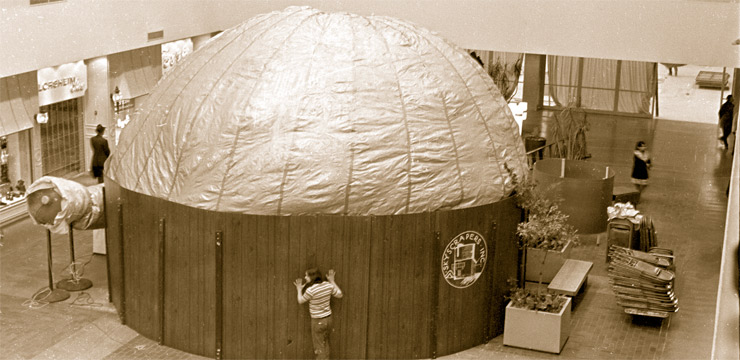
Portable Planetarium Show Transcript
February 2005 :

Welcome ladies and gentlemen to our portable planetarium, which, as far as we know, is the first in the world of this size. Your host is Skyscrapers, Inc., The Amateur Astronomical Society of Rhode Island.
While our dome inflates, let us tell you something about our organization. In 1932, a group of amateur astronomers gathered at Ladd Observatory at Brown University in Providence Rhode Island. Under the leadership of Professor Charles Smiley of Brown, they founded Skyscrapers.
In 1936 the society incorporated and purchased Seagrave Memorial Observatory in North Scituate, Rhode Island, which it has operated ever since. The observatory is open to the public every Saturday night from 7:30 to 10:30 PM or later. Directions to the observatory can be found on the admission tickets you were given for this planetarium program. We hope you will visit us some Saturday night.
Skyscrapers also holds monthly meetings, sometimes at the observatory and other times at local colleges and universities. You are welcome to attend. The date and location of our next meeting can also be found on your admission ticket.
You are also invited to attend Astronomy Day sponsored by Skyscrapers and scheduled for July 19th of this year. This will be an afternoon and evening event aimed at the person with an interest but not too much knowledge in astronomy.
Members of Skyscrapers participate in a wide range of astronomical activities – telescopic observation, astrophotography, meteor observation, and solar eclipse expeditions, to name just a few.
If you would like to consider joining our society full information can be obtained at our display at the other end of the mall, at the observatory, or by writing to our membership Chairman, whose name and address is also on your admission ticket.
Ever since early man looked up at the stars and wondered what they were, astronomy has fascinated people. Perhaps that’s because astronomy asks questions. Questions that go beyond those which man might have first asked. An important question man’s been asking for a long time is, “What is man’s purpose? Why is he here?” But astronomy warns, before you can ask why we’re here, you’ve got to ask, where is here? If someone asks you where you are, your first impulse is to look around you for landmarks. When man looks around he sees the stars. The stars, to us they appear to be tiny pinpoints of light in the sky. Nothing more. But what are they really?
Each star is literally a sun! A sun much like our own - some bigger, some smaller. But each one capable of having a solar system of its own. Perhaps even Earth-like planets. These suns are so far away that the light we see from even the very closest of them took more than four years to get here. And there are an incredible number of these suns in the known universe. Just in our own local group, The Milky Way Galaxy, there are many billions of them. On a clear night, most of them form a hazy strip across the sky. But this is only because we are looking at our galaxy from the inside. If we looked at our galaxy from the outside, at a distance of thousands of trillions of miles, our galaxy might look like this.
And our own star, the sun, isn’t even near the center. It’s at about two-thirds of the distance from the center to the edge. Just an average star in an average position among billions of other stars. So when we look at our earth in true perspective as one of nine planets orbiting around a very average star, it begins to seem very insignificant. And in relation to the rest of the universe, it is. But it does have an important distinction. It is the home of a civilization, our civilization. And nobody knows, nobody can even estimate, how unique this distinction is. It is true that the chances are there are millions of civilizations in the known universe. And this worries some people. They are afraid of contact with beings from beyond our own solar system. But wouldn’t it the more frightening if there isn’t anybody else in the universe?
It’s easy to think that with all the people, the billions of people that populate this earth, we could never be lonely. But consider this: our galaxy is not the only galaxy, not by any means. In fact, if every man, woman and child could be evenly distributed throughout the known universe, each could have his own galaxy, and still leave plenty to spare. And if you wanted to explore your own galaxy, and you discovered a method of exploring one sun and its solar system every second, and you began exploring at birth, you would die of old age before you had explored even 3% of your galaxy. Now that’s lonely.
On earth, our idea of lonely is to be alone in a building at night. But on Earth we can always pick up the telephone and call another person in another building. Can we do the same thing with other civilizations in the universe?
A few months ago, a radio signal was transmitted from the huge radio telescope at Arecibo, Puerto Rico. Aimed at M13, a globular cluster of stars within our own galaxy, it was man’s hello to the universe. Even now the message speeds towards its target at the incredible speed of 186,000 miles every second. But don’t hold your breath waiting for a reply. For even at that speed it will take 32,000 years for the signal to arrive at its destination. 32,000 years! And if someone or something hears our message and replies immediately, it will be another 32,000 years before we receive their answer. 64,000 years!!!! Will anyone be listening for a reply? Will man still exist? Will our planet, battered by our own carelessness still be capable of supporting life?
The earth has been called our spaceship and in a very real sense it is. It’s atmosphere, both the window through which we look out at the universe beyond and our protection from the cold vacuum of space. And man will need the earth for some time to come. For it will take time to break the bonds which bind man to his world and to this solar system. For break them we must, if for no other reason than they exist. That has always been mankind’s way. But we will need time. And we must keep our spaceship, the Earth, working, at least until the day we can leave. For it is not indestructible as we are learning. How long will we need it? No one knows. But only by keeping our spaceship in good repair will we have all the time in the world.
Related Topics




